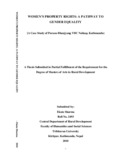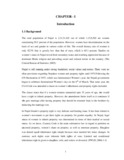Please use this identifier to cite or link to this item:
https://elibrary.tucl.edu.np/handle/123456789/3650| Title: | Women’s Property Rights: A Pathway Togender Equality [A Case Study of Purano Bhanjyang VDC Naikap, Kathmandu] |
| Authors: | Sharma, Ekata |
| Keywords: | Women’s Property;Gender |
| Issue Date: | 2010 |
| Publisher: | Department of Rural Development |
| Institute Name: | Central Department of Rural Development |
| Level: | Masters |
| Abstract: | Women rights activist argued that the issue of property rights was not about materialgain but was for basic human right and women’s dignity. So the objective of the study isto analyze whether the property right could be a pathway to gender equality or not. The study area is located in the central development region of Nepal; Naikap, puranobhanjyang VDC Kathmandu, Nepal. Field survey and review method was used to collectthe data. The respondents were selected by using purposive sampling method. Both the primary and secondary data were used for the study. Womens of Puranobhajyang, Naikap were the source of primary data whereas information related toproperty rights, published and unpublished reports, books and Journals were the sourcesof secondary data. Descriptive statistics such as average, percentage, diagrams were used to describe thefindings of the study. The computer based Exel program was used to analyze the data.Based on the the result of the study, conclusion was drawn and sets of recommendationsfor future research and planning was proposed. The analysis reveals that most of the respondents agreed with the issue of property rightsi.e 82.5% whereas few(17.5%) opposed the issue. Most of the respondents in the studybelieves that patriarchy society is a constrain for giving equal right to women. Also62.5% of the respondents doesn’t have right to their property and 40% have facedeconomic dependency due to lack of property. The conclusion of the study is that property could be a pathway to gender equality tosome extend but cannot resolve the problem of gender inequality. Most of the respondentsprefers to get intangible property like rights to education, Knowledge, Skill, Employment,Health, Rights to marriage rather than tangible like wealth to solve the problem ofgender inequality. |
| URI: | http://elibrary.tucl.edu.np/handle/123456789/3650 |
| Appears in Collections: | Rural Development |
Files in This Item:
| File | Description | Size | Format | |
|---|---|---|---|---|
| COVER.pdf | 44.3 kB | Adobe PDF |  View/Open | |
| CHAPTER.pdf | 260.59 kB | Adobe PDF |  View/Open |
Items in DSpace are protected by copyright, with all rights reserved, unless otherwise indicated.
